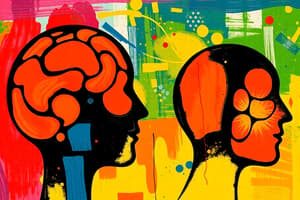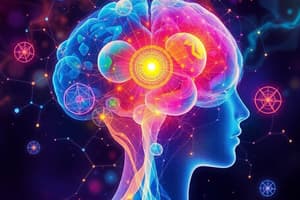Podcast
Questions and Answers
What is the definition of learning according to the text?
What is the definition of learning according to the text?
- A change in behavior that is only temporary
- A relatively permanent change in behavior as a result of experience (correct)
- A change in behavior that is not influenced by experience
- A temporary change in behavior as a result of experience
What is an example of learning provided in the text?
What is an example of learning provided in the text?
- A child only asking their dad for cookies
- A baby consistently calling their mom 'mama' (correct)
- A person never touching a red burner on the stove again
- A person feeling nauseous at the sight of cheese puffs
What does the text state is the basis for how learning occurs?
What does the text state is the basis for how learning occurs?
- The relative permanence of the behavior change
- What happens before the behavior, what happens after the behavior, and how much effort is required (correct)
- The organism's interaction with the environment
- The specific type of learning, such as classical or operant conditioning
Which of the following is NOT considered an example of learning according to the text?
Which of the following is NOT considered an example of learning according to the text?
What is the key difference between the examples of learning provided in the text?
What is the key difference between the examples of learning provided in the text?
What is the main purpose of the text?
What is the main purpose of the text?
What is the main focus of the text?
What is the main focus of the text?
According to the quote attributed to Da Vinci, what is the danger of relying solely on practice without science?
According to the quote attributed to Da Vinci, what is the danger of relying solely on practice without science?
What are the three ways mentioned to obtain knowledge about how the world works?
What are the three ways mentioned to obtain knowledge about how the world works?
What is the distinction made between basic research and the process mentioned in the text?
What is the distinction made between basic research and the process mentioned in the text?
What is the purpose of manipulating the independent variable (IV) in an experiment?
What is the purpose of manipulating the independent variable (IV) in an experiment?
What is the prime directive of science?
What is the prime directive of science?
Which of the following is NOT a basic assumption of science?
Which of the following is NOT a basic assumption of science?
What does the principle of parsimony state?
What does the principle of parsimony state?
What is the basic strategy of science?
What is the basic strategy of science?
What is the necessary requirement for believability in science?
What is the necessary requirement for believability in science?
What is the overriding assumption of science?
What is the overriding assumption of science?
Which of the following is an example of public behavior?
Which of the following is an example of public behavior?
Which of the following is an example of private behavior?
Which of the following is an example of private behavior?
What does the quote suggest about science?
What does the quote suggest about science?
Which of the following best describes public behavior?
Which of the following best describes public behavior?
In the given context, what does 'objective' mean?
In the given context, what does 'objective' mean?
Which of the following is NOT a human receptor?
Which of the following is NOT a human receptor?
What is the term used to describe the sense of muscle movement and position?
What is the term used to describe the sense of muscle movement and position?
Receptors are necessary for which of the following?
Receptors are necessary for which of the following?
Which of the following is NOT considered part of the cutaneous sense (skin and just below the skin surface)?
Which of the following is NOT considered part of the cutaneous sense (skin and just below the skin surface)?
What term is used in the text to describe the general location or surroundings that can affect behavior?
What term is used in the text to describe the general location or surroundings that can affect behavior?
Which of the following is NOT listed as a human receptor in the text?
Which of the following is NOT listed as a human receptor in the text?
Flashcards
What is learning?
What is learning?
A relatively permanent change in behavior as a result of experience.
Define Behavior
Define Behavior
Anything an organism does, including internal events and processes.
What is the Environment?
What is the Environment?
All the events, stimuli, and conditions that can influence behavior.
What is Behavior Analysis?
What is Behavior Analysis?
Signup and view all the flashcards
What is Science?
What is Science?
Signup and view all the flashcards
What is Determinism?
What is Determinism?
Signup and view all the flashcards
What is Empiricism?
What is Empiricism?
Signup and view all the flashcards
What is parsimony?
What is parsimony?
Signup and view all the flashcards
What is Philosophic Doubt?
What is Philosophic Doubt?
Signup and view all the flashcards
What is Description in Science?
What is Description in Science?
Signup and view all the flashcards
What is Prediction in Science?
What is Prediction in Science?
Signup and view all the flashcards
What is Control in Science?
What is Control in Science?
Signup and view all the flashcards
What are Receptors?
What are Receptors?
Signup and view all the flashcards
What is Vision?
What is Vision?
Signup and view all the flashcards
What is Hearing?
What is Hearing?
Signup and view all the flashcards
What is Smell?
What is Smell?
Signup and view all the flashcards
What is taste?
What is taste?
Signup and view all the flashcards
What is Cutaneous sense?
What is Cutaneous sense?
Signup and view all the flashcards
What is Organic sense?
What is Organic sense?
Signup and view all the flashcards
What is Kinesthesis?
What is Kinesthesis?
Signup and view all the flashcards
What is Vestibular sense?
What is Vestibular sense?
Signup and view all the flashcards
What is an Independent Variable?
What is an Independent Variable?
Signup and view all the flashcards
What is a Dependent Variable?
What is a Dependent Variable?
Signup and view all the flashcards
Study Notes
Introduction to Behavior Analysis
- Behavior Analysis is the science of learning, which is a relatively permanent change in behavior as a result of experience.
- Experience refers to an organism's interaction with the environment.
Examples of Learning
- Eating too many cheese puffs and experiencing nausea and vomiting, then associating the smell and sight of cheese puffs with nausea.
- Touching a red hot burner on a stove and getting burned, then avoiding red hot burners in the future.
- A baby babbling "mama" and being picked up and hugged by mom, resulting in consistently calling mom "mama".
- A sister asking a big brother to play and being ignored, then only asking the big brother to play from then on.
The Science of Learning
- Learning is a relatively permanent change in behavior as a result of experience.
- Learning occurs based on what happens before behavior, what happens after behavior, how much effort is required to do the behavior, and many other variables.
Definition of Science
- Science is a systematic approach to understanding natural phenomena, characterized by description, prediction, and control.
- Science relies on determinism as its fundamental assumption, empiricism as its prime directive, experimentation as its basic strategy, replication as its necessary requirement for believability, parsimony as its conservative value, and philosophic doubt as its guiding conscience.
Basic Assumptions of Science
- Empiricism: observing and recording the phenomenon of interest.
- Parsimony: the simplest explanation is usually the correct one (Occam's Razor).
- Philosophic Doubt: all knowledge is tentative, and being open to new data leading to new interpretations/explanations.
- Determinism: the universe is a lawful place.
Goals of Science
- Description: identifying the phenomena of interest.
- Prediction: forecasting what will happen under certain conditions.
- Control: influencing the phenomena of interest.
Human Curiosity and Knowledge
- There are three ways to obtain knowledge on how the world works: systematic investigation, experiment, and common sense/logic.
- Experiment involves manipulating variables (independent variables) and observing the effects (dependent variables).
Behavior and the Environment
- Behavior is what the organism is doing.
- The environment includes events, stimuli, and conditions that can affect behavior.
Human Receptors
- Receptors are sense organs that respond to energy changes in the environment (e.g., light, sound, heat, etc.).
- Examples of human receptors include:
- Vision
- Hearing
- Smell
- Taste
- Cutaneous sense (skin and just below the skin surface)
- Organic sense (deep sensations)
- Kinesthesis (muscle sense)
- Vestibular sense (balance)
Studying That Suits You
Use AI to generate personalized quizzes and flashcards to suit your learning preferences.



